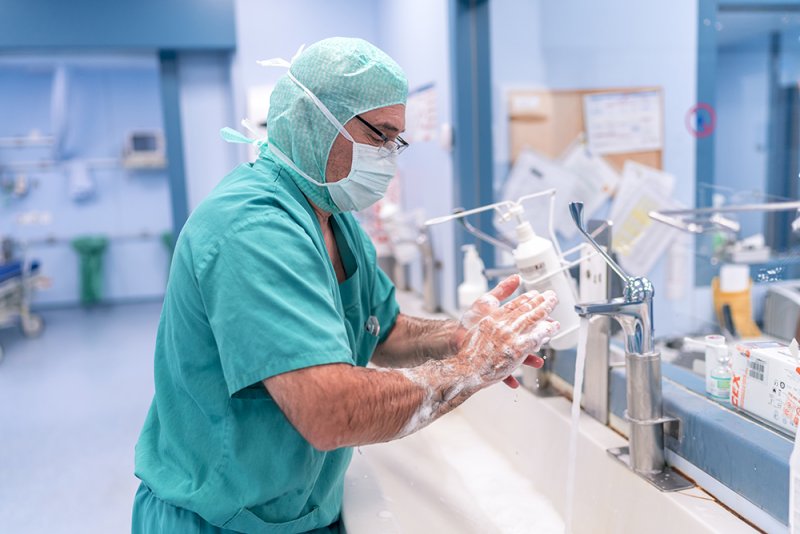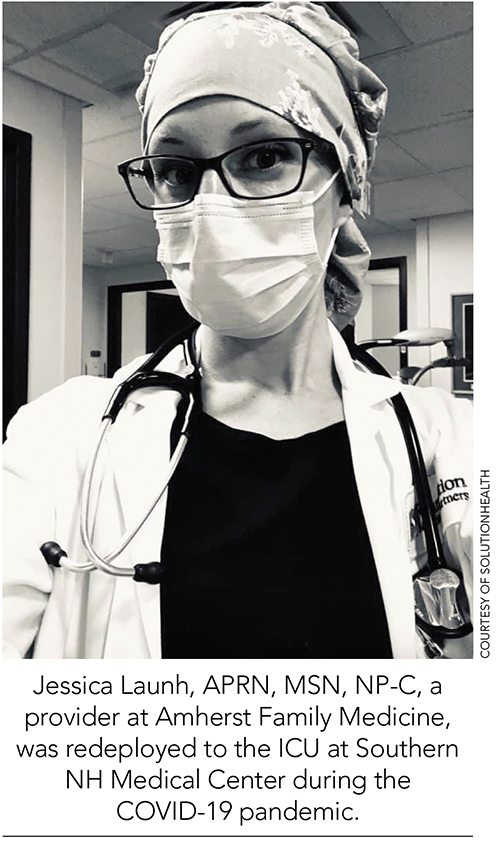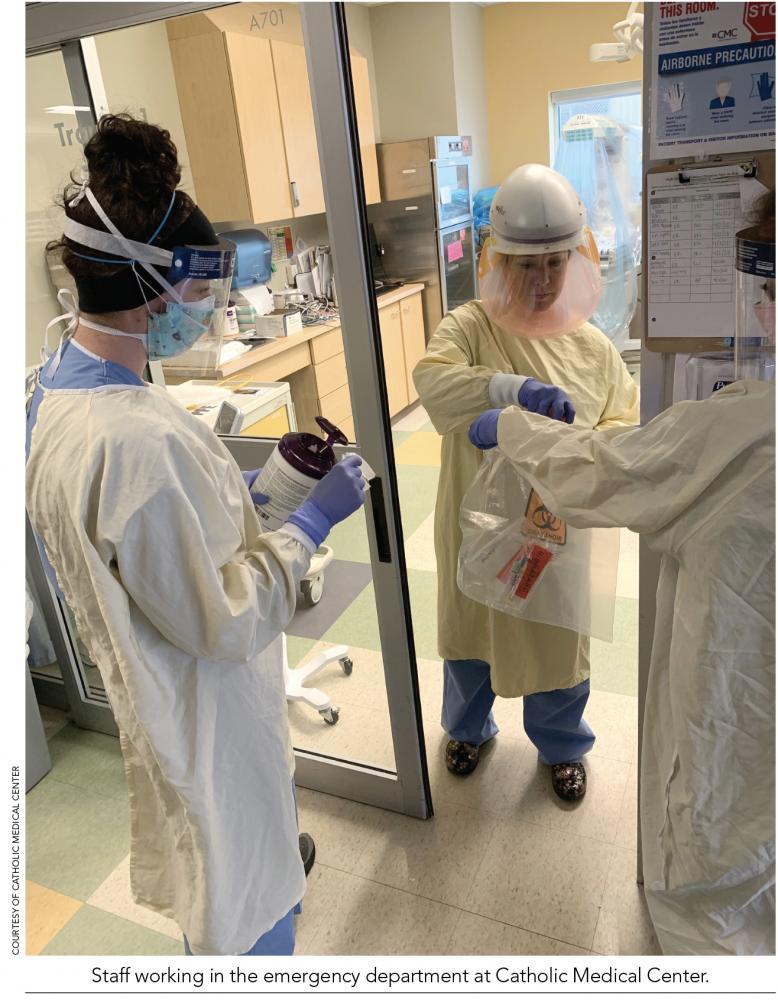 As the pandemic puts unprecedented pressure on healthcare workers, hospitals have found a variety of ways to adjust their staffing to minimize layoffs and meet increased demand in emergency departments.
As the pandemic puts unprecedented pressure on healthcare workers, hospitals have found a variety of ways to adjust their staffing to minimize layoffs and meet increased demand in emergency departments.
With the onslaught of COVID-19, elective surgeries and other revenue generating procedures were shut down (and only began to ramp up again in mid-May), resulting in hundreds of healthcare workers being furloughed or seeing their pay cut.
 “These revenue losses and added expenses did force us to take measures to stem our losses. In mid-April, we placed roughly 650 employees on furlough status,” says Kelly Corbi, COO of SolutionHealth, which encompasses Elliot Health System in Manchester and Southern NH Health System in Nashua. “Those employees are eligible to collect unemployment but maintain their benefits. Others saw reduced hours and pay reductions. In fact, our SolutionHealth senior leadership team took a 15% reduction in pay.”
“These revenue losses and added expenses did force us to take measures to stem our losses. In mid-April, we placed roughly 650 employees on furlough status,” says Kelly Corbi, COO of SolutionHealth, which encompasses Elliot Health System in Manchester and Southern NH Health System in Nashua. “Those employees are eligible to collect unemployment but maintain their benefits. Others saw reduced hours and pay reductions. In fact, our SolutionHealth senior leadership team took a 15% reduction in pay.”
At Catholic Medical Center in Manchester, spokesperson Lauren Collins-Cline says the decline in patient volume and, in turn, drop in revenue led the hospital to place 423 employees on a 60-day furlough in late April and either reduced hours or pay for an additional 914 employees.
Retrain and Redeploy
These and other hospitals, though, are finding ways to stem the unemployment tide. SolutionHealth retrained and redeployed many employees across both systems, Corbi says. “This includes physicians, advanced practice providers, nurses, patient care assistants and more who have valuable skills that could be applied to areas where we have need. An example is a pediatrician who was redeployed to the Emergency Department,” Corbi says.
CMC had nurses answering phones in the employee health call center and those in clinical roles helped with patient screening at the front entrances, Collins-Cline says. “Health care positions are often license specific so retraining would also mean relicensing—something that would be impractical during these circumstances,” she says.
With the governor’s revised orders allowing hospitals to resume some of the revenue-generating activities, CMC anticipates bringing back more employees as patient volume increases. “It will be slow at first, but we expect to gradually increase in the coming weeks,” Collins-Cline says.
Samantha O’Neill, vice president of HR at Portsmouth Regional Hospital, says while they did not lay off any staff, many are working reduced hours. “We are working very hard to re-deploy them to other areas in our facility and that of our sister facilities at Frisbie Memorial Hospital [in Rochester] and Parkland Medical Center [in Derry] to ensure they are receiving their full amount of hours.”
O’Neill says they have cross-trained existing staff to ensure that they can maintain their hours. Many of the nurses that work in the OR, outpatient clinics and other departments have experience working in the ICU or other inpatient care units and are getting refresher classes to work alongside the nurses in those units.
Sarah Currier, vice president of workforce strategy at Dartmouth-Hitchcock (D-H) in Lebanon, says from the beginning of the pandemic, the organization has prioritized cross-training and upskilling. “First, we have created a program called ‘Staff-Match’ to make sure that employees with skills and availability can be reassigned to different areas of our facility that may need those skills and have openings, whenever possible,” says Currier. “Next, we have redeployed employees with specific skill sets,” such as training in donning and doffing personal protective equipment (PPE) “to have them teach their colleagues and share that knowledge.”
She adds that the Staff-Match program allows D-H to move staff to other areas that are in need, due to additional patient census, or staff absenteeism due to childcare, reducing the need to furlough. “We have also taken this time to train up our staff in critical skills in order to care for potential COVID-19 patients. We are now working on our recovery plan, which we know will positively impact staffing needs,” Currier says.
To Hire or Not?
In April, SolutionHealth instituted a hiring freeze for all non-essential positions. However, Corbi says they continue to hire essential and strategic roles, particularly respiratory therapists, licensed nursing assistants and environmental services staff.
 O’Neill says Portsmouth Regional Hospital is still hiring in some areas, but the main focus is ensuring staff are able to work the hours for which they were hired. The same is true for CMC, where Collins-Cline says they would first bring an employee back from reduced hours or furlough before having a new hire start for a particular role.
O’Neill says Portsmouth Regional Hospital is still hiring in some areas, but the main focus is ensuring staff are able to work the hours for which they were hired. The same is true for CMC, where Collins-Cline says they would first bring an employee back from reduced hours or furlough before having a new hire start for a particular role.
“Here at CMC we are still hiring for certain, specific positions directly related to patient care, although start dates will vary widely. We’re hiring in the operating room, as well as for RNs, LNAs, and various tech positions,” Collins-Cline says. “We are mostly holding off on hiring for positions that are not directly related to patient care, but we still have about 100 openings.”
Dartmouth-Hitchcock is still hiring, says Currier, with priority placed on roles that will help save money by reducing reliance on travel and overtime or will help facilitate time-sensitive, urgent elective surgeries, procedures and ambulatory visits.
“We are so incredibly proud of our employees and their ability to work together. We have created a D-HH Heroes platform for co-workers to thank each other and for community members to share messages to our frontline staff,” Currier says.
This article is being shared by partners in The Granite State News Collaborative. For more information visit collaborativenh.org.

 Current Issue - April 2024
Current Issue - April 2024